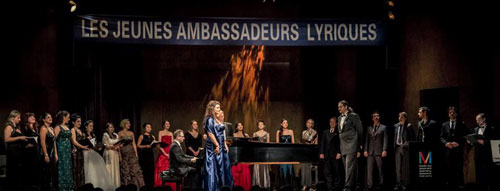Canadians in High Demand by Emilie White
/ December 1, 2013
Version française...
Flash version here.

As happens every year, a contingent of young Canadian opera singers and their international counterparts displayed their talents for opera directors in the 20th Jeunes Ambassadeurs Lyriques Gala. These young singers vie for engagements and stages.
During the performance in Bourgie Hall, even at the beginning of their careers, the power of the Canadian voices was striking.
|
| Results of the 20th Jeunes Ambassadeurs Lyriques |
| First place: mezzo-soprano Christianne Bélanger |
Other winners:
Leigh-Ann Allen, Laurence Guillod (Switzerland), Lian Liu (China), Chantal Nurse, Inga Williams, Jang Eun Young (Korea), sopranos
Beste Kalender, Emma Parkinson, Laurelle Jade Froese, Katrina Westin, mezzo-sopranos
Yujoong Kim (Corea), tenor
Andrey Andreychik, Jonathan Estabrooks, Philip Kalmanovitch, Pierre Rancourt, Cairan Ryan, Anton Vinogradov (Russia), baritones |
Vincent Monteil, music director of the Opera Studio at the National Opera of the Rhine, believes that this power is a distinguishing feature of Canadian voices. “These are quite powerful and open voices, maybe not always refined, that would be the only criticism. These are big voices to fill the big halls that you have in North America. The provincial theatres in France have no more than 1,000 seats generally, and maybe 2500 seats in Paris. In Salle Wilfrid-Pelletier: 3,000 seats, that’s enormous! It shapes the voice.”
The demand for Canadian opera singers is greater than that of French singers, who are, today, less numerous on the international scene. Certainly, France formerly produced its own opera stars, such as Régine Crespin in the 50s and 60s, but today, only Roberto Alagna and Natalie Dessay carry the torch for France on the international scene. In comparison, Canadian and Quebec singers are swarming international stages.
Monteil admits that the international reputation of French singers is lesser than that of Canadian singers. “[French singers] are not very numerous, but there have been some in every generation – especially baritones – who have made careers, especially at the Metropolitan Opera.”
According to Jeannette Aster, General Driector of the Académie de la Roche D’Hys, the brilliance of Canadian singers can be attributed to the Canadian education system, which according to her is more rigorous. “Canadians are exposed to more languages because of immigration. They are used to that openness. When singing opera, one must sing in various languages, and for a Canadian that is not strange. They are very open, and open to receive. And that is a great advantage for Canadian singers.”
According to Hans Nieuwenhuis, General Director of the Orfeo Foundation, the open spirit of Canadians facilitates their integration into other countries. “I have had many Canadians in my program in Amsterdam, at least 35 or 30, over ten years. It was never a problem for them to find their place in a different society.”
Monteil, for his part, reckons that a certain compromise with family life could be a limiting factor for French singers. He believes that French singers are content to satisfy the local market, while being able to come home in the evening. “The choice to pursue an international career implies certain sacrifices. It is very challenging in terms of family life, personal life, jet lag, etc. These are costs that discourage the French from moving around too much, say, to America. The market is big enough where they are that they do not have to move too far to work.”
Translation: Rona Nadler
Backstage: Suggestions to Young Opera Singers from Directors Around the World
Three days before the 20th Gala des Jeunes Ambassadeurs Lyriques, some fifteen opera directors got together. From Russia to Italy, passing by British Columbia, they discussed the professional training programs for young opera singers now offered in all major European and Canadian centres.
In Moscow, a young opera singer would have to learn a large number of roles since there are 300 performances annually. In Vancouver, the singer would be asked to get a style coach to learn to dress properly for gala evenings. Fencing lessons would be on the agenda at some studios. Others, such as in Düsseldorf, partner with universities.
In Munich, the social significance of acting on stage is emphasized. Difficulties with the diva syndrome are discussed: singing and acting alone work well, but problems arise in interacting with others on stage. Professional training tries to bridge the gap.
Planning the preparation for a role is just as important. In Strasbourg, a young opera singer will be handed a schedule to follow, with the hope that this will eventually be assimilated. In Munich, there is no coaching in this area, the hope being that the singer will learn it naturally. In Canada there is specialized training offered in this area.
Finally, some programs organize mentorship in a structured way, while others offer more flexibility.
In summary, understanding the present needs of the opera business will enable a young singer to better assess, and land, a future contract.
Translation: Karine Poznanski
Version française... | |

